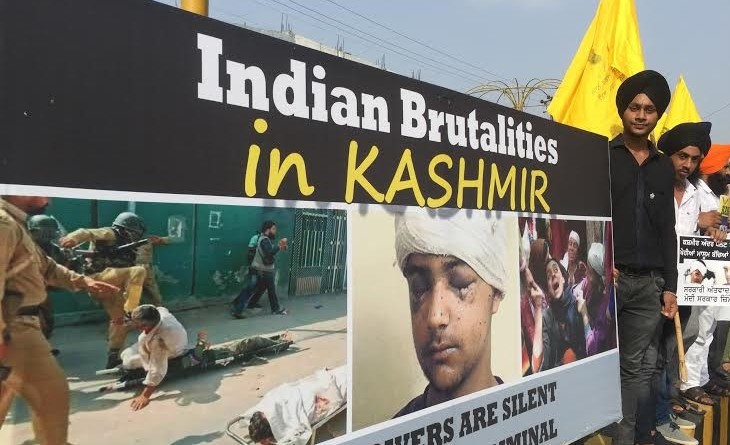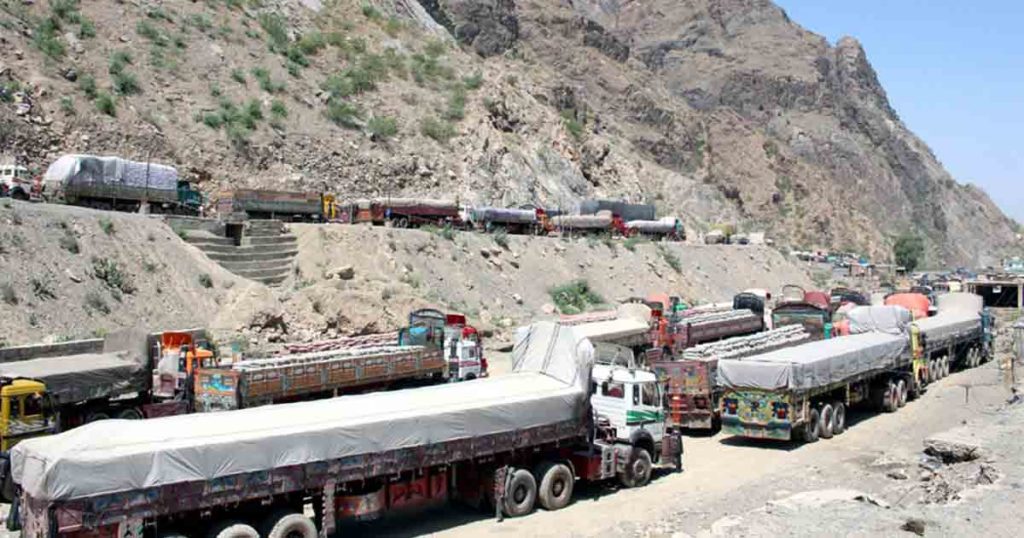The Kashmir territorial dispute has been the apple of discord between the two South Asian nuclear powers, India and Pakistan. Ominously, after the abrogation of article 370 and sub clause 35 A by New Delhi, the Kashmir dispute has morphed into a more threatening volcano; possible eruption of this dormant volcano could lead to an all out confrontation between India and Pakistan. Such a conflict could escalate into a catastrophic nuclear war in the region.
There are certain factors which may cause an Indo Pak clash due to the simmering Kashmir dispute. These multiple reasons include Indian water war against Pakistan; Indian designs to annex Azad Kashmir; New Delhi possible surgical strikes against Islamabad; operationalization of the disruptive cold start doctrine; Indian blatant human rights violations in Kashmir and the hawkish language of Modi’s administration against Pakistan.
Needless to say that such an Indo Pak war might lead to deaths, destruction and devastation in the entire region. Given the enormity of destruction due to a possible Indo-Pak war, it is imperative for Pakistan to devise an out-of-the-box approach with respect to the long drawn-out Kashmir dispute.
Besides highlighting the Indian occupation of Kashmir, Pakistan should once for all cultivate robust relations with the comity of nations; this could help Pakistan exert mounting pressure on the war-mongering Modi administration to come to negotiating table with Pakistan.
It would be imperative to shed light on a brief history of the Kashmir dispute. Among other princely states, Kashmir was left to decide its fate. When a large number of Pakistani fighters entered Kashmir in 1947 to liberate it from Maha Raja Hari Singh, the Maha Raja sought Indian help. Resultantly, India and Pakistan waged a short war on Kashmir in 1947-1948. New Delhi sought the intervention of the United Nations. The UN passed some resolutions giving the right of the referendum to the Kashmiris. However, India backed out and blocked these resolutions. Due to the Kashmir dispute, India and Pakistan fought wars in 1965 and 1999.
What is more alarming is the presence of nuclear warheads in the region. On 5 August, 2019, the BJP government abrogated Article 370 and sub clause 35 A, abolishing the special status of Indian Occupied Kashmir (IOK). New Delhi has imposed a curfew and continues blatantly trampling down the rights of the Kashmiris. Alarmingly, due to this authoritarian behaviour of India, it is widely feared that the Kashmir dispute could bring about a major war between Pakistan and India. Such a conflict will have catastrophic impacts on the south Asian region; it might escalate into an apocalyptic war between the two countries.
This raises an important question: what are factors/ reasons which may trigger off a war between India and Pakistan due to the territorial dispute of Kashmir? First and foremost, Indian nefarious design to wage a water war against Pakistan could cause an Indo Pak war in the region. The Modi administration has repeatedly said that “the blood and water cannot flow together”; now, the annexation of IOK has bestowed a carte blanch to the BJP government to stop Pakistan’s share of water. Indian barrages on the Jhelum River, the Baghliar Hydropower Project on the Chenab River and the Kishangangha Dam have already reduced water flow to Pakistan. In case of any terror attack on the Indian soil, New Delhi could stop water flow to Pakistan from its occupied Kashmir. Thus, such an Indian move could compel Pakistan to declare war against India.
Besides this, the BJP government’s attempt to send troops to Azad Kashmir could also cause a major Indo-Pak war on the Kashmir dispute. Some top level BJP leaders have threatened Pakistan to send troops to Pakistani administrated Kashmir so as to annex it. Indian purported surgical strike and the Balakot incident show that New Delhi can use its military base from IOK to conduct military operations inside Azad Kashmir.
Indian occupation of Kashmir has dangerously emboldened the Modi government to carry out attacks on Pakistan. Any such moves on the part of India could instigate Pakistan to respond befittingly, causing an Indo Pak war on the Kashmir dispute.
In addition, any surgical strike by India from the IOK can also cause an Indo-Pak war. Occupation of a big part of Kashmir has bought India near to Pakistani territory. Now, India has placed missiles along the line of control (LOC); according to foreign minister Shah Mahmood Qureshi, New Delhi is looking for the soft target inside Pakistani territory. India is bent upon conducting a secret surgical strike to destroy so-called sanctuaries of freedom fighters in Pakistan. India’s misadventure was seen when it had carried out attacks in Balakot. Though Pakistan did not let escalate the Balakot incident resulting into a full-blown war, Islamabad could this time launch attacks inside India if New Delhi repeats the Balakot episode. Thus, any surgical strike from the IOK could cause a deadly Indo-Pak war.

Apart from this, Indian occupation of the IOK has emboldened the BJP government to execute its hawkish “Cold Start Doctrine”. Under the doctrine, India wishes to conduct secret attacks inside Azad Kashmir against targets of its choice at will. New Delhi is of view that since the IOK is under complete blackout and there is no media access, it can easily conduct night raids inside Pakistan administrated Kashmir. To execute this doctrine, New Delhi has already placed missile on the LoC and deployed about one million troops along the same border. After sensing such Indian moves, Pakistan has made its forces all alert to quickly respond to India. Therefore, the resort to the Cold Start Doctrine could lead Pakistan and India towards a dangerous war.
Aside from this, any attack inside Indian occupied Kashmir may also trigger off an Indo Pak war. Due to Indian high handedness in Kashmir, freedom fighters could retaliate by carrying out a Uri-like attack in India. All freedom fighters are watching what India is doing in the Valley. As it is a traditional Indian policy, it would heap blame on Pakistan for such possible attacks. As a result, New Delhi could carry out attacks inside Pakistan. What is more worrying is that the Indian annexation of Kashmir has already emboldened the Modi government. Needless to say that Pakistan this time will retaliate with full might, thus plunging the entire region into a major war.
The possible causes of Indo-Pak war on Kashmir dispute don’t end there; Indian gross human rights violations in the IOK could instigate Pakistan to come to rescue the long-suppressed Kashmiris. Indian troops are involved in abducting young Kashmiris, torturing elderly people and sexually assaulting women in the Valley. The residents of the IoK have no access to water, foods, hospitals and educational institutions. Thus, Pakistan may run out of patience over Indian atrocities in Kashmir. Such a development could probably result in a major Indo-Pak conflict.
Moreover, threats hurtled at Pakistan by the Indian Army Chief due to the simmering situation in the IoK could also bring out a devastating Indo-Pak war in the region. Such warmongering remarks block confidence-building measures between the two nations. Besides, such threats create an atmosphere of war in the region. Due to the warmongering threats issues by top security officials of India, the situation could slide out of control anytime in the near future. Thus, such hawkish remarks on the part of Indian security establishment might push Pakistan and India to a major conflict.
Last but not least, the presence of the supremacist BJP government in India is also one of the major reasons which could lead to an Indo-Pak war in the Kashmir dispute. The BJP is adamant about introducing Hindutva in the IoK through another Shuddi and Sangathan like initiative. Under the thumb of the BJP, hardcore Hindus have been provided with a carte blanch to start converting the Kashmiri Muslims into Hinduism and expelling Muslims from the IoK. The abrogation of Article 35 A has created a fertile ground for Hindu preachers and landlords to gradually purchase property in the IoK. Resultantly, the Hindus would outnumber those of Muslims in the region. The Kashmiri Muslims will harshly react to such Indian designs. Since the innocent Kashmiris have the backing of Pakistan, such a mass conversion of Muslims in the IoK could cause a major Indo-Pak conflict over the Kashmir dispute.
After taking the factors of a possible Indo-Pak war over Kashmir into consideration, it would be pertinent to shed some light on the implications of such a conflict. The probable Indo-Pak war over the Kashmir dispute could lead to a major water war; this might have dire repercussions for the economy in Pakistan. Moreover, any Indo-Pak war could escalate into a nuclear showdown, thereby resulting in death of millions of people in the South Asian region. Besides this, poverty, hunger and starvation will double down in the region.
Such a conflict could cause a final death blow to the already dormant SAARC organization. Therefore the projected Indo-Pak conflict does not bode well for the region already burdened with many issues.
Given the probability of an Indo-Pak conflict and the enormity of its repercussions, it is imperative for Pakistan to devise a sagacious policy toward the Indian annexation of Kashmir. In this regard, the following steps would be immensely helpful: firstly, Pakistan should more highlight the Indian occupation of the IoK on all international forums. In this regard, Islamabad should appoint a special representative on Kashmir. He/she should be tasked to visit major capitals and mould public opinion towards the sensitivity of the Kashmir dispute.
Secondly, Pakistan with Chinese assistance ought to capitalize on the Shanghai Cooperation Organization (SCO) to put pressure on India. The SCO next meeting is scheduled to take place in June this year. Pakistan should seek Russian and Chinese support so that these countries would convince India to come to the negotiating table with Pakistan on the Kashmir dispute.

Thirdly, though difficult, it is still an effective strategy to normalize trade relations with India and allow New Delhi to trade with Afghanistan from Wagah to Peshawar. Increased bilateral trade and economic interconnectedness will provide a bargaining chip to Pakistan; Islamabad could use this opportunity to bring India to the negotiation table in the future.
Fourthly, Pakistan should rein in banned groups so that they will not attack the Indian soil. This measure will help steadily restore trust between the two countries.
Fifthly, Pakistan should also continue its endeavour to make the word community, especially the UNO and the European Union, put pressure on India to resolve the dispute of Kashmir. Mounting and consistent pressure always yield positive results.
To conclude, being the bone of contention between India and Pakistan, the perennial and hitherto unresolved Kashmir dispute has caused three major conflicts in the region. “Kashmir is a nuclear flashpoint between Pakistan and India”, warned former American President Bill Clinton. Now, there is a high probability that the Kashmir dispute could lead to an Indo-Pak war in the past-abrogation of Article 370 by the Modi administration. Indian gross human rights violation in the disputed valley, its disruptive water war against Pakistan and New Delhi’s war-mongering military doctrines might push both the atomic powers towards the brink of a full-blown confrontation in the foreseeable future. Therefore, the “silver lining” for Pakistan is the cultivation of amicable relations with all major powers meant to pressurize India into negotiating with Pakistan on the Kashmir dispute. More importantly, Pakistan’s leadership needs to hold “hope, courage, confidence and selfless devotion”, as suggested by Quaid-e-Azam to put an end to the Kashmir dispute once and for all.
Contributed by:
Alifiya Aun Ali




